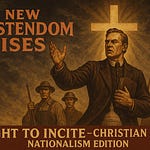The smoldering controversy at Apologia Church, led by elders James White and Jeff Durbin (and the third one with all the face jewelry who doesn’t wear long britches, whose name I don’t remember…beaver or wombat or something), serves as a prelude to a broader malaise infecting certain Neo-Reformed circles. The discussion Protestants need to have in this current hour is if we’ve really cast off the authority of a Pope in Rome, only to have a thousand hipsters in Pope hats controlling the lives of congregants in evangelical Neo-Reformed churches all across America.
As Protestia and David Morrill of Protestia Tonight have meticulously chronicled, White and Durbin have wielded church discipline like a cudgel, targeting Christians for social media critiques and branding dissent as sin worthy of excommunication. Their demand for “loyalty unto death” in their church covenant, for example, conjures images of cult-like devotion, while Durbin’s secret recordings of church members, later weaponized to silence critics like Tim Hurd, reveal a chilling obsession with control. Their audacity peaked in their clash with Joel Webbon, where, alongside Tobias Riemenschneider, demanded he punish a member for an unwholesome meme, then lambasted him for refusing to let them puppeteer his church from afar. This “Hard Shepherding,” as Morrill aptly dubs it, is but a spark in a larger conflagration of authoritarianism sweeping through some Reformed churches, where elders morph into overlords, meddling in realms far beyond their biblical mandate. For example, the suggestion that users of anonymous X accounts give their elders passwords so they can read all their interactions has become a serious suggestion, which is flatly insane on its face.
Yet, the blaze of Hard Shepherding extends far beyond Apologia’s walls, scorching the lives of congregants in ways that transcend social media censorship. This article ignites a broader exploration, fanning the flames of scrutiny on how elders in these circles have crowned themselves referees, gatekeepers, and moderators of their flocks’ personal lives—intruding into domestic disputes, parenting choices, courtship decisions, and even personal finances. Such overreach, cloaked in spiritual authority, is not only unbiblical but a grotesque distortion of the shepherd’s role. Drawing from Scripture, Reformation wisdom, and the historic Baptist commitment to soul liberty, it’s necessary to expose the folly of this ecclesiastical tyranny and its peril to the church’s vitality, and insist that believers must stand as modern dissenters against the tide of draconian ecclesiastical control, lest Satan’s leaven corrupt the Body of Christ through errant elders.
HARD SHEPHERDING: A TAPESTRY OF TYRANNY
Far from historic or orthodox, let alone Biblical, the term “Hard Shepherding” harkens back to the Shepherding Movement of the 1970s and 1980s, a charismatic experiment led by figures like Charles Simpson and Bob Mumford, which sought to impose rigid accountability structures on believers. As documented on GotQuestions.org, this movement demanded submission to “shepherds” who controlled major life decisions—where to live, whom to marry, even whether to seek medical care. Congregants were tethered to a hierarchical pyramid, their every move scrutinized, their tithes funneled upward, and their dissent crushed with accusations of unspirituality. Though the movement collapsed under the weight of its own excesses, its ghost lingers in today’s Neo-Reformed churches, where elders don new mantles of control, wielding authority not as shepherds but as autocrats.
The Shepherding Movement emerged as a charismatic attempt to bring order to the chaotic fervor of the Charismatic Renewal in the 1970s. Few newly Reformed believers today are aware the charismatics already tried what they’re now suggesting as a model of church government. Mumford, a charismatic teacher with a knack for gripping oratory, envisioned a discipleship model where believers submitted to personal “shepherds” who oversaw their spiritual and personal lives. The movement, peaking with an estimated 50,000 to 100,000 followers, sought to address perceived spiritual immaturity through rigid accountability, emphasizing New Testament “one another” passages and the mentoring model of 2 Timothy. Yet, what began as a quest for maturity spiraled into a suffocating web of control, with Mumford’s teachings demanding that disciples seek their shepherd’s approval for decisions as intimate as marriage or as mundane as moving homes. This top-down structure, propagated through New Wine magazine and nationwide conferences, promised spiritual protection but often delivered oppression, as shepherds wielded unchecked power over their flocks’ lives.

The movement’s unraveling was as dramatic as its rise. By the mid-1970s, criticism from charismatic heavyweights like Pat Robertson, who branded it “witchcraft” akin to Jonestown, and Kathryn Kuhlman, who refused to share a stage with Mumford, exposed its cult-like tendencies. A 1975 open letter from Robertson to Mumford decried the movement’s obsession with “submission” over Christ, citing instances like a 20-year-old “shepherd” extracting tithes from peers at Oral Roberts University. The movement eventually fractured, with Mumford issuing a 1989 public apology for fostering “unhealthy submission” and “perverse obedience” to human leaders. Despite the apology, the movement’s legacy lingers, with Charles Simpson continuing a polished version under the “Covenant Movement” banner, and its echoes resonating in Neo-Reformed circles today, where elders similarly blur the line between guidance and domination.
The Mumford saga remains a cautionary tale of good intentions warped by the allure of control, leaving a trail of broken lives and a warning for churches tempted to revive such authoritarianism. Beyond social media censorship, Hard Shepherding manifests in intrusive meddling in congregants’ personal lives. Among the Reformed who are now dabbling in this, elders in these circles have been known to intervene in non-violent domestic disputes, acting as self-appointed arbitrators in marital spats that lack any biblical warrant for church involvement. A 2021 Faithroots article recounts chilling anecdotes: elders poring over members’ payslips to dictate tithing amounts, rebuking two elderly women for taking a vacation without permission, or even dictating what Bible studies they could attend outside the church. Such tales paint a picture of pastors not as guides but as overlords, peering through the windows of their flock’s lives, ready to pounce on any perceived infraction.
Parenting decisions, too, fall under this suffocating oversight. Some Neo-Reformed elders, eager to enforce a monolithic vision of godliness, prescribe rigid rules for child-rearing, from schooling choices to disciplinary methods. It’s one thing for a pastor to extol the virtue of homeschooling over public education, but another thing to discipline families who don’t make that decisions. Some insist on specific disciplinary practices, branding alternatives as sinful. This overreach ignores the biblical principle that parents, not pastors, are entrusted with raising their children in the “nurture and admonition of the Lord” (Ephesians 6:4). As Expository Parenting Ministries notes, “while parents should emulate the shepherding role of pastors in teaching and guiding, this does not grant elders license to dictate the minutiae of family life.”
Courtship decisions are another battleground. In some churches, elders act as matchmakers or veto-wielding gatekeepers, requiring approval for romantic relationships or even mandating betrothal-like arrangements. This echoes the Shepherding Movement’s obsession with “covering” life decisions, where young couples were forbidden to court without a shepherd’s blessing. Such control strips believers of their God-given autonomy, reducing love to a transaction overseen by ecclesiastical bureaucrats. The Bible, while calling for wisdom in relationships (Proverbs 18:22), never assigns elders the role of romantic overseers.
Personal finances also fall prey to this overreach. Stories abound of elders demanding access to bank statements, dictating budgets, or pressuring congregants to tithe beyond their means. Some elders even demand to know the income levels and see the tax statements of their church members, to ascertain their proportional level of giving and whether or not their giving is truly “sacrificial.” Such practices transform the offering plate into a tool of coercion, contradicting the cheerful, voluntary giving commended in 2 Corinthians 9:7. Elders who play financial watchdog assume a role Scripture never grants, turning stewardship into subjugation.
These intrusions—whether in domestic disputes, parenting, courtship, or finances—cast elders as referees of life’s every play, gatekeepers of personal choices, and moderators of private consciences. Yet, Scripture assigns them no such roles. 1 Timothy 3:1-7 and Titus 1:5-9 describe elders as teachers and examples, tasked with preaching, protecting, and modeling godliness—not policing the minutiae of daily life. Their authority is limited to what Scripture explicitly commands, and their leadership is to be marked by humility, not dominance.
BIBLICAL REBUKE OF AUTHORITARIAN ELDERS
Scripture paints a vivid portrait of elders as servant-leaders, not despots. In 1 Peter 5:2-3, Peter admonishes elders to “shepherd the flock of God… not domineering over those in your charge, but being examples to the flock.” The Greek term for “domineering” (katakurieuo) evokes a lordship that crushes rather than uplifts, a far cry from the gentle care of a shepherd. Jesus Himself modeled this in John 10:11, declaring, “I am the good shepherd. The good shepherd lays down his life for the sheep.” Contrast this with Hard Shepherding, where leaders sacrifice their flock’s freedom for their own power.
Matthew 18:15-17 further undermines the authoritarian model. Church discipline, when necessary, is a congregational process, not an elder’s prerogative. If a brother sins, the matter escalates from private confrontation to the church as a whole, not to a cabal of leaders wielding unilateral power. Hebrews 13:17’s call to “obey your leaders” is not a blank check for control but a directive to follow godly teaching, contingent on leaders fulfilling their role as soul-watchers, not soul-controllers.
The “loyalty unto death” demanded by some churches is a blasphemous overreach. Scripture commands separation from false teachers (2 John 1:10-11; Romans 16:17), prioritizing fidelity to Christ over human institutions. Elders cannot bind congregants to lifelong allegiance when God Himself calls for discernment. Galatians 5:1 proclaims, “For freedom Christ has set us free; stand firm therefore, and do not submit again to a yoke of slavery.” Hard Shepherding’s yoke—whether over social media, marriages, parenting, or purses—betrays this freedom, chaining believers to human authority.
Elders are to lead by example, not edict. 1 Timothy 4:12 urges leaders to be models of godliness, not enforcers of conformity. Their role is to feed the flock with God’s Word (Acts 20:28), bind up the broken (Ezekiel 34:4), and equip the saints (Ephesians 4:12)—not to snoop through their lives or dictate their choices. By overstepping these bounds, Hard Shepherding elders invert the biblical order, transforming shepherds into overlords with cattle prods, calling unbiblical power “authority” and calling vindictive punishment “discipline.”
THE IRONY OF NEO-REFORMED TYRANNY
The irony of Hard Shepherding in Neo-Reformed circles is as glaring as a cathedral spire against a stormy sky. These churches, often vocal critics of Roman Catholicism’s centralized authority, have crafted a local papacy more intrusive than Rome’s. As I noted on X, “The ‘Hard Shepherding’ ecclesiastical model… requires more authoritarian control than the Pope ever wielded.” Protestants who decry the Pope as an antichrist now mimic his errors, assuming a divine right to govern consciences. The Pope rarely meddles in individual Catholics’ daily decisions, yet Neo-Reformed elders demand oversight of tweets, tiffs, and tithes, wielding a scepter heavier than any pontiff’s.
Any Baptist of twenty-five years ago would ask plainly who the heck those elders think they are. Perhaps we should have listened to the old-timers who warned us that the “elder rule” Calvinists would run rough-shod over the congregation. Back then, we were sure this was just a return to Biblical ecclesiology. But as of late, it appears that yet again we dismissed a faithful warning, and elder leadership has morphed into elder rulership, and now is quickly turning into an elder dictatorship.
This paradox is rooted in a shallow, pop-culture Reformed theology, as one X user quipped, that “thinks Reformed Theology started with Lecrae and ends with John MacArthur.” Lacking the depth of historic Reformed thought, these first-generation post-Reformed Resurgence churches embrace a caricature of authority, mistaking control for care. Their critique of Catholicism’s excesses rings hollow when they outdo Rome in micromanaging their flocks, revealing a transformation into the very beast they claim to slay.
REFORMATION WISDOM: CHRIST, NOT ELDERS, IS HEAD
The Reformers’ battle cries against papal tyranny resonate with piercing clarity today. Martin Luther, in his Babylonian Captivity of the Church (1520), thundered that “no human authority can impose new commandments or ceremonies as necessary for salvation.” The church, he argued, has no power to bind consciences beyond Scripture’s explicit commands. Elders who demand conformity on extrabiblical matters—be it social media posts or parenting styles—echo the Pope’s error, usurping Christ’s headship.
Philipp Melanchthon, in the Augsburg Confession (1530), clarified that elders’ authority is limited to preaching, administering sacraments, and remitting sins—not dictating life’s details. John Calvin, in his Institutes (Book IV, Chapter 10), insisted that “Christ alone is the lawgiver of his church,” and any attempt to impose additional burdens violates Christian liberty. John Knox, railing against Catholic tyranny, called for a church governed by Scripture and congregational accountability, not human overlords.
These Reformers championed the priesthood of all believers (1 Peter 2:9), affirming that every Christian has direct access to God and the right to discern His will through Scripture. Hard Shepherding elders, by contrast, act as mediators, demanding submission to their whims. Their actions betray the Reformation’s core tenet: Christ, not man, is the head of the church.
One might ask how the elder can lead, if he can’t censor the thoughts or control every action of the congregation. The answer is simple; they control the teaching of the pulpit. But it appears that many are not content with leading us by Scripture and their Biblical admonition, and instead (lazily) seek to rule over us by executive fiat.
SATAN’S LEAVEN AND THE SHIELD OF SOUL LIBERTY
Satan’s strategy often involves poisoning the church from the top, as history attests. The Catholic Church’s drift into error under errant popes and councils illustrates how leaven spreads through leadership, corrupting the lump (Galatians 5:9). Neo-Reformed elders, by centralizing power, create a similar vulnerability. If leaders err, their unchecked authority can lead the flock astray, stifling correction and entrenching falsehood.
Baptists and congregationalists, with their doctrine of soul liberty, have historically resisted this danger. The 1689 London Baptist Confession affirms that believers are accountable to God alone for their consciences, free to dissent on matters not explicitly addressed in their confession. Issues like Zionism or political correctness, absent from such confessions, fall under personal discernment, not elder enforcement. Dissenters on social media, like modern Luthers declaring “Here I stand,” embody this liberty, resisting conformity to defend truth.
If Hard Shepherding prevails, the church risks becoming a monolith where error festers unchecked. 1 Corinthians 11:19 notes that factions can reveal truth, as dissent prompts scrutiny. By punishing critics, elders silence this corrective process, endangering the church’s fidelity. Believers must be free to challenge leaders, especially on secondary issues, to preserve the Body’s purity.
A CHURCH UNCHAINED
The blaze of Hard Shepherding threatens to consume the church’s freedom, but Scripture and Reformation wisdom offer a cooling stream. Elders are not referees, gatekeepers, or moderators of personal lives but humble shepherds, leading by example and Word. By embracing soul liberty, the church can resist Satan’s top-down corruption, ensuring that every believer, like a Berean (Acts 17:11), tests all things against Scripture. The dissenters—those bold voices on X or in the pews—are not rebels but guardians, standing firm to keep the church true to Christ, its only Head.
If you appreciate my work, please consider an $8 a month or $80 year subscription to access exclusive content (like the rest of this article and our entire archive).
If you don’t want a subscription, please consider a one-time gift of your choosing by clicking the ‘coffee link’ below. This is one of the things I do to provide for my small farm and big family, so I sure appreciate it.

















Share this post